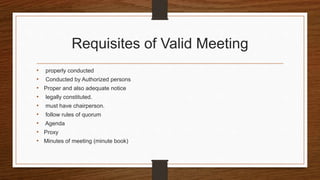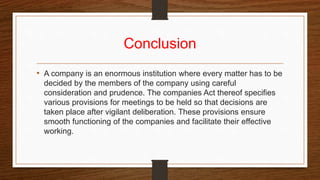This document discusses different types of company meetings required by law, including statutory meetings, annual general meetings, extraordinary general meetings, meetings of directors, creditors, debenture holders, and contributories. It provides details on the procedures that must be followed for calling, convening and conducting valid company meetings according to the Companies Act of 1956. This includes requirements regarding notice periods, quorum, agenda, voting, minutes, reports and more. Company meetings are an important part of corporate governance and management.

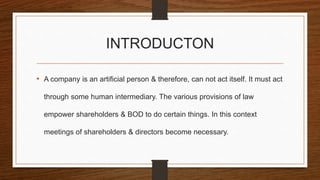
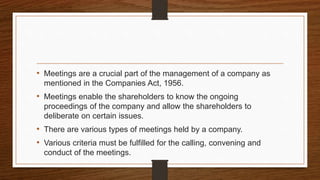
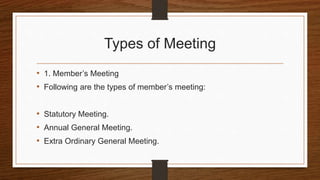
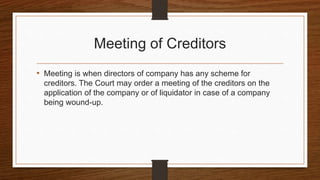
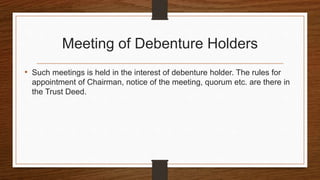
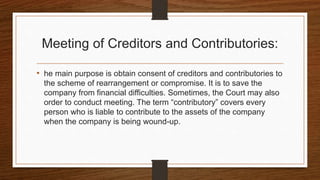

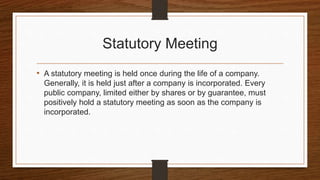
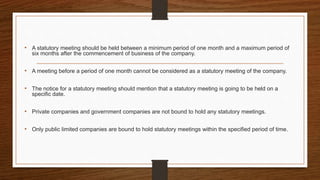
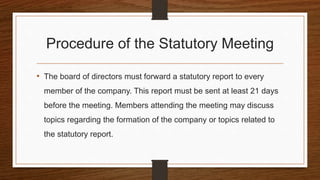
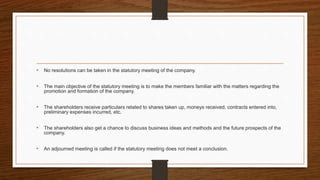
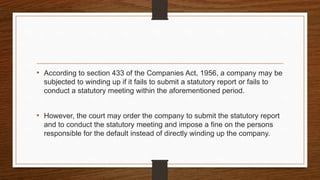
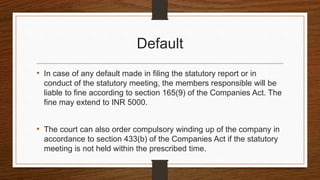
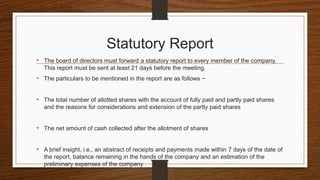
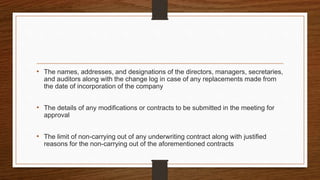
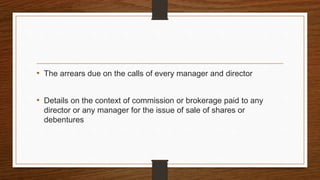
![Annual general meeting(AGM)
• According to section 96[i] of the companies Act 2013, every
company public and private company is required to hold one
general meeting in a year supervised by its directors to evaluate
the progress of the company and plan future course of action which
is known as annual general meeting.](https://image.slidesharecdn.com/4-210501102329/85/4-company-meetings-18-320.jpg)
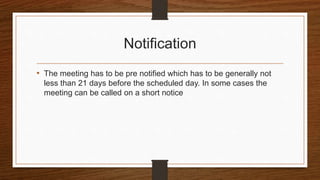
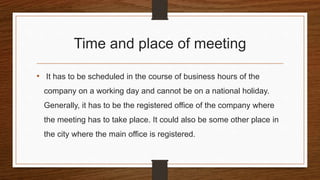
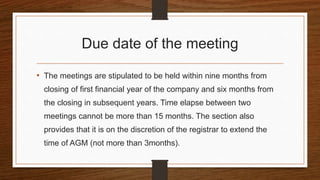
![Tribunal calling the meeting
• In case of failure to hold meeting in required time under section 96,
the Act provides power to the Tribunal[iii] (which is a quasi-judicial
body made to adjudicate disputes arising out of company law) on
submission by any member might call or provide directions for
calling the meeting[iv].](https://image.slidesharecdn.com/4-210501102329/85/4-company-meetings-22-320.jpg)
![Punishment for default
• section 99[v] of the companies Act 2013 provides that whosoever is
liable for defaulting would be penalised with a fine extending up to
one lakh depending on the circumstances.](https://image.slidesharecdn.com/4-210501102329/85/4-company-meetings-23-320.jpg)
![First Annual General Meeting
• After its formation companies hold a meeting either immediately or
within six months. It is called first AGM or “statutory meeting”[viii]. It
was a compulsory provision until 2013 amendment of company law.
Now it is on discretion of the company to hold this meeting.](https://image.slidesharecdn.com/4-210501102329/85/4-company-meetings-24-320.jpg)
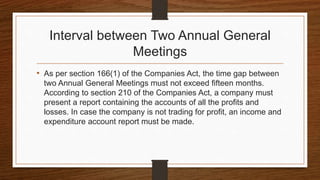
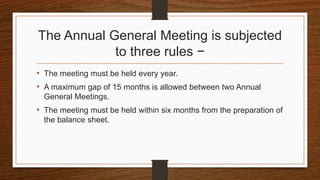
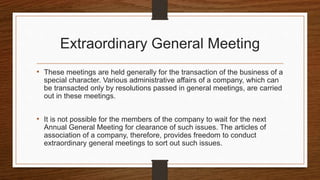
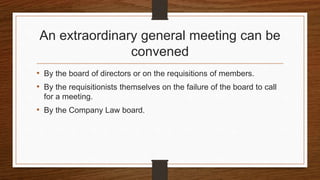
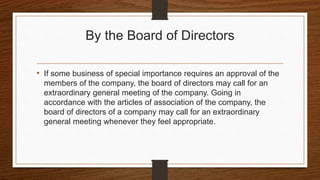
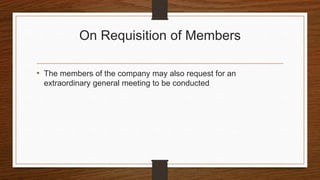
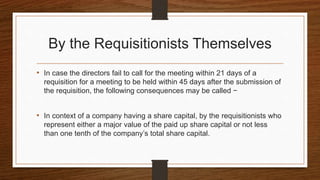
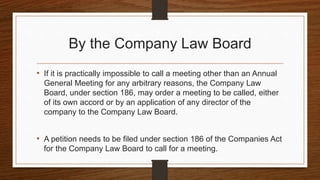

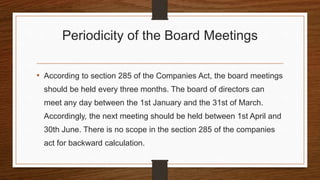
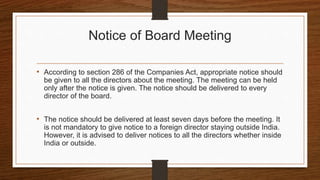
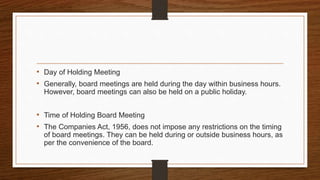
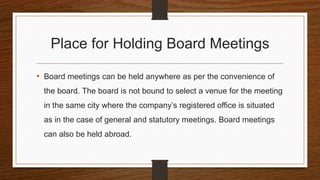
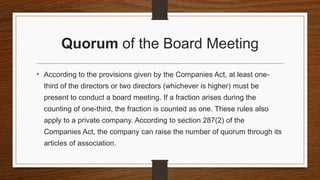
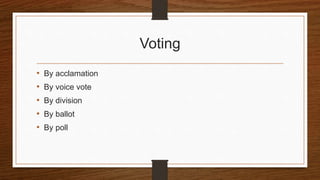
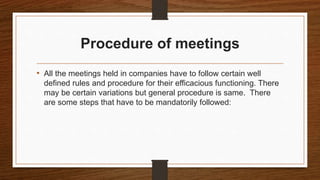
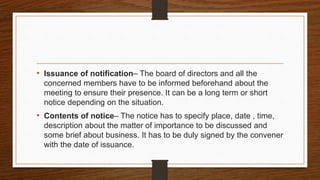
![• Quorum – The person responsible for notifying the meeting has to
ensure that the meeting has been pre notified to appropriate quorum
which has to be present in the meeting as specified in the Act. The
quorum has to be maintained throughout the meeting. [xx]
• Chairman – Every meeting has to be compulsorily presided by a
chairperson. Generally, the chairman of the Board of Directors is the
Chairman of the meeting.[xxii] He is responsible to initiate the discussion
of motions in the meeting and conclude the same. It’s his responsibility to
ensure smooth functioning of the meeting. The chairman can also be
selected by voting through hands.](https://image.slidesharecdn.com/4-210501102329/85/4-company-meetings-42-320.jpg)
![• Resolutions– These are the decisions taken in every meeting. When
these are put to consideration and voting there are certain procedures
and rules to be followed. These are provided in various sections[xxiii].
• Voting – There might be matters on which there is no general consensus
and voting has to be done. After detailed discussion, the chairperson may
call the matters (if undecided) for voting. There have been specified
requirements for voting in different meetings in the companies Act,
2013[xxiv]. The process of voting is supervised by the chairman.](https://image.slidesharecdn.com/4-210501102329/85/4-company-meetings-43-320.jpg)
![• Adjournment and Minutes – After careful consideration and discussion,
the meeting is concluded which is called as adjournment and
subsequently dissolution where members disperse. These deliberations
have to be documented in an official document of the company providing
gist of every meeting which are called minutes of meeting. Every
important detail of the meeting has to be included as said in companies’
act 2013. [xxv]
• Report – companies are required to prepare report of the meeting as in
case of AGM detailing the conduct of the meeting. The copy of the same
has to be filed with the registrar.](https://image.slidesharecdn.com/4-210501102329/85/4-company-meetings-44-320.jpg)
